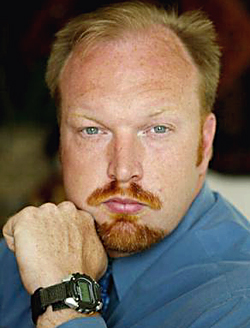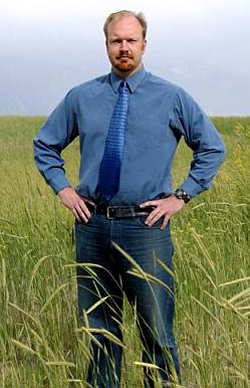[MORE IRAQ / ABU GHRAIB][THE-SIGNAL.COM][S.C.V. HISTORY IN PICTURES]
Interrogator: Chaos Reigned at Abu Ghraib
• Veteran of Guantanamo Bay encountered dramatic differences when he checked in for work at Iraq prison.
By Leon Worden
Signal City Editor
Sunday, June 20, 2004

Pictured at his Salt Lake City home on June 9, Torin S. Nelson
was the most experienced interrogator at Abu Ghraib prison last fall and is helping the government get to the bottom
of the prisoner abuse scandal. AP/Steve C. Wilson
|
he urgency to find out where Saddam Hussein was hiding last November and December turned Abu Ghraib prison into an out-of-control zoo, one of the interrogators told The Signal on Saturday.
Speaking by telephone from his Salt Lake City home, Torin S. Nelson described a climate of change and confusion where understaffed commanders couldn't get adequate support to glean information from swelling numbers of detainees.
Nelson said he didn't know John B. Israel by name, although he would probably "recognize him by his face." Nor did he speculate why Army Maj. Gen. Antonio Taguba identified Israel, an Iraqi-American translator from Canyon Country, as one of four people "either directly or indirectly responsible" for the prisoner abuse.
Nelson also didn't talk Saturday about any abusive incidents he may have witnessed.
An articulate, 35-year-old family man with a dozen years of experience as an interrogator both with the Army and the Utah National Guard, Nelson has been cooperating with various government inquiries into the prisoner abuse scandal and expects to be called to testify at congressional hearings next month.
Indeed, the indignation he incurred from other prison personnel when he started cooperating with Taguba — who identified him as a "witness" as opposed to a "suspect" — factored into his decision to leave Abu Ghraib in early February. But a bigger factor, he said, was the escalation of hostile actions by insurgent forces.
Nelson saw huge differences between prison operations at Guantanamo Bay, where he spent about seven months from mid-2002 to early 2003 as a National Guard interrogator, and Abu Ghraib, where he arrived in late November as a private contract employee of CACI International Inc.
"You're comparing apples and oranges between Gitmo (Guantanamo Bay) and Abu Ghraib," he said. "They were geared differently."
Guantanamo Bay handled "individuals (from) a worldwide terrorist network," he said, while Abu Ghraib dealt with the indigenous Iraqi population.
Moreover, Guantanamo Bay had a secure perimeter that isolated it from outsiders, and its "proximity to the mainland and an already established military base" made it "close enough to get the necessary infrastructure," he said.
"Abu Ghraib was ad hoc," he said. "It was not ever originally supposed to be set up" as a military detention center. "It just appeared because of overcrowding at other locations."
"I had from the very beginning complained about the lack of overall security," he said.
Just days before Nelson's arrival, coalition commander Lt. Gen. Ricardo Sanchez had made a structural change in prison operations, transferring responsibility from military police to military intelligence officers.
The result was turmoil.
"There were a lot of difficulties in the fundamental operations," Nelson said. Coupled with "the fact of using so many civilian interrogators" — like Nelson — "people really didn't know who they were working for."
He said the prison sorely lacked staffing.
"There was a lack of manpower in detention operations (and in) intelligence collection operations," he said. "Everybody in Iraq was stretching resources. You were making do with what you have."
Although he wasn't privy to the conversations, Nelson dismissed the assertions of other military intelligence personnel that high-ranking Army officials from Guantanamo Bay told them to crack down harder on detainees at Abu Ghraib.

Nelson at home on June 9. AP/Steve C. Wilson
|
"People in Gitmo were possibly sent there ... to fix the problems (and) to try to get them on the same sheet of music," Nelson said. "They had experience with interrogations."
He said interrogators at Guantanamo Bay knew the difference between a police interrogation and an intelligence interrogation.
"Military interrogations are fundamentally different from law enforcement interrogations," he said.
"With a law enforcement interrogation, there's a hope that it will lead to a conviction." Police interrogators want to "break someone down (to get) a confession," he said.
"With an MI (military intelligence) interrogation, if you get someone to confess, great. But you can garner information and save lives" without using harsh tactics, he said.
"I had my very own particular style" of interrogating, Nelson said. Usually working with "groups of detainees," he would assess the available intelligence information, conduct research, perform interrogations and then, "based on all of the background I would do, I would change course if necessary," he said.
"Interrogation isn't about breaking someone's will, it's about breaking down the barriers between you," he recently told The Associated Press.
Going into Abu Ghraib, "I was one of the more experienced interrogators," he told The Signal.
Nelson has made a career of interrogating a wide range of people for Army intelligence, "both in peacekeeping and in the war on terror" — from Warsaw Pact defectors to al-Qaida members.
At Abu Ghraib, the interrogation center was staffed by "a mix of military and civilian personnel" and divided into five sections, such as one for force protection and another to handle extremist loyalists.
He said each section had anywhere from two to six interrogation teams, known as "tiger teams."
While others — such as Lt. Gen. Lance L. Smith in Senate testimony last month — have described the tiger teams as consisting of one interrogator, one interpreter and one intelligence analyst, Nelson gave a slightly different depiction.
Nelson said the tiger teams generally consisted of an interrogator and an analyst, and "they would set up an interrogation session and request an interpreter."
Interpreters like John Israel were assigned to each of the five sections, and tiger teams would often try to use the same individual for translating services — although "teams were moved around a lot," Nelson said. "I myself moved through various teams."
At one point, he said, there was a "break team" which, as the moniker implies, would use particularly harsh tactics in an effort make detainees talk. Nelson said he didn't know who served on the break team.
But, he said, the break team disbanded and the generally "chaotic" atmosphere abated after the Dec. 13 capture of Saddam.
Israel hasn't commented on his role other than to tell Taguba's investigators that he witnessed no abusive acts — something Taguba didn't believe.
Israel's attorney has not answered questions, and his wife, Roza Israel, has told The Signal, "His job was translating. That's it. (He had) no say-so in anything."
A spokesman for Titan Corp., the San Diego company that supplied Israel and other translators to the prison, has said the linguists had a "passive role" in the interrogation process.
Israel is misidentified in Taguba's report as an employee of CACI, and ironically, Taguba misidentified Nelson as an employee of Titan. Nelson said CACI recruited him after learning of his service at Guantanamo Bay.
Nelson is aware of the speculation that has arisen in the aftermath of the Taguba report about a connection between Israel and the country of the same name — "because of his name," Nelson said — but he said he knew of no Israeli involvement at Abu Ghraib. (The nation of Israel is not a member of the coalition force in Iraq, and an Israeli consular official in Los Angeles told The Signal that John Israel is not an Israeli citizen. Public records show he was born either Aug. 15 or Oct. 15, 1955, in Iraq.)
As for foreign operatives at Abu Ghraib, Nelson said, "The only information I'm aware of is, I saw some individuals from British intelligence actually in uniform, but I don't know if they were conducting operations or (observing). There may have been some other things going on, I don't know."
©2004, THE SIGNAL · ALL RIGHTS RESERVED.

